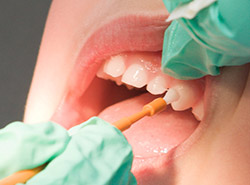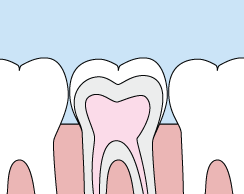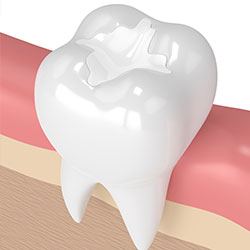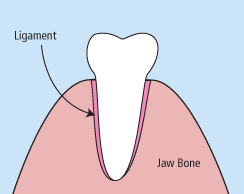Common Procedures
Topics on this page
Dental Exams and Cleanings
 Regular exams are essential for maintaining your child's oral health. During each visit, we will:
Regular exams are essential for maintaining your child's oral health. During each visit, we will:
- Check for cavities and signs of tooth decay
- Inspect gums for gingivitis or periodontal disease
- Perform a thorough cleaning, including polishing and plaque removal
- Perform a thorough teeth cleaning
Visiting us every six months ensures that any concerns are addressed, and you can ask the doctor any questions about your child’s dental care.
Fluoride
 Fluoride treatments are a fast and highly effective method for preventing cavities. They work by strengthening tooth enamel, making it more resistant to decay, while also helping to remineralize weakened enamel. Additionally, fluoride inhibits bacterial activity, reducing the production of acids that can harm teeth.
Fluoride treatments are a fast and highly effective method for preventing cavities. They work by strengthening tooth enamel, making it more resistant to decay, while also helping to remineralize weakened enamel. Additionally, fluoride inhibits bacterial activity, reducing the production of acids that can harm teeth.
Sealants
 Brushing alone may not reach every part of your teeth, especially the small pits and grooves where decay can start. Dental sealants provide extra protection by sealing these areas, making teeth smoother and less likely to harbor plaque, which helps prevent cavities.
Brushing alone may not reach every part of your teeth, especially the small pits and grooves where decay can start. Dental sealants provide extra protection by sealing these areas, making teeth smoother and less likely to harbor plaque, which helps prevent cavities.
Sealants are resins that bond to the deep grooves of teeth, making brushing more effective. They are typically applied to children’s permanent teeth.
Silver Diamine Fluoride
Silver Diamine Fluoride (SDF) is a non-invasive treatment that effectively stops the progression of dental caries. While it turns decayed areas black, healthy tooth structure remains unaffected. SDF is a great option for patients who cannot tolerate restorative procedures, and it's also an option for families seeking alternative ways to manage decay. Whether used as a temporary measure or a long-term solution, regular monitoring is crucial, as cavities can reactivate. We will keep track of these areas during follow-up and routine visits.
Fillings
 We use high-quality materials like composite resins for fillings, which blend well with natural teeth. These materials are ideal for both anterior and posterior teeth, depending on the extent of decay, offering a durable and esthetic solution to restore your teeth's function and appearance.
We use high-quality materials like composite resins for fillings, which blend well with natural teeth. These materials are ideal for both anterior and posterior teeth, depending on the extent of decay, offering a durable and esthetic solution to restore your teeth's function and appearance.
Crowns
 We use crowns, such as stainless steel crowns (SSCs), to restore and protect teeth that are broken, malformed, or severely affected by decay. SSCs are strong, durable, and metal-colored, covering the entire tooth to restore function and provide long-lasting protection. These crowns are typically used on molars due to their ability to withstand chewing forces. Crowns are a reliable option for preserving teeth that no longer have sufficient structure to support a filling.
We use crowns, such as stainless steel crowns (SSCs), to restore and protect teeth that are broken, malformed, or severely affected by decay. SSCs are strong, durable, and metal-colored, covering the entire tooth to restore function and provide long-lasting protection. These crowns are typically used on molars due to their ability to withstand chewing forces. Crowns are a reliable option for preserving teeth that no longer have sufficient structure to support a filling.
Pulp Therapy
If a tooth has extensive decay or has been damaged by trauma, treatment may be necessary to restore the tooth and prevent infection from spreading. Depending on how much of the nerve is affected by decay, trauma, or disease, there are different types of pulp therapy available. After taking X-rays, your dentist will assess the status of the nerve and recommend the appropriate treatment.
Extractions
 Tooth extractions may be necessary for both primary and permanent teeth due to decay, orthodontic needs, or to prevent damage to surrounding teeth. In some cases, baby teeth may need to be removed to make room for permanent teeth.
Tooth extractions may be necessary for both primary and permanent teeth due to decay, orthodontic needs, or to prevent damage to surrounding teeth. In some cases, baby teeth may need to be removed to make room for permanent teeth.
Space Maintainers
If your child's tooth is lost early due to decay or an accident, maintaining the space is crucial to prevent future dental issues. Without a space maintainer, surrounding teeth can shift, potentially blocking the eruption of permanent teeth and increasing the need for orthodontic treatment.
Mouthguards & Nightguards
 Protecting your smile during sports is crucial, whether or not you wear braces. Mouthguards help prevent injuries to your teeth and gums, and the American Dental Association recommends wearing one for full-contact sports. Your dentist can recommend the most suitable type of mouthguard based on your age, dental development, and specific needs.
Protecting your smile during sports is crucial, whether or not you wear braces. Mouthguards help prevent injuries to your teeth and gums, and the American Dental Association recommends wearing one for full-contact sports. Your dentist can recommend the most suitable type of mouthguard based on your age, dental development, and specific needs.
If you wake up with jaw pain, earaches, or headaches, or if you grind your teeth at night (bruxism), a nightguard may be needed. Custom-made by your dentist, nightguards help protect your teeth from damage caused by grinding or clenching while you sleep.


